Module4 Unit 3 Language in use(共47张PPT无素材)
文档属性
| 名称 | Module4 Unit 3 Language in use(共47张PPT无素材) | 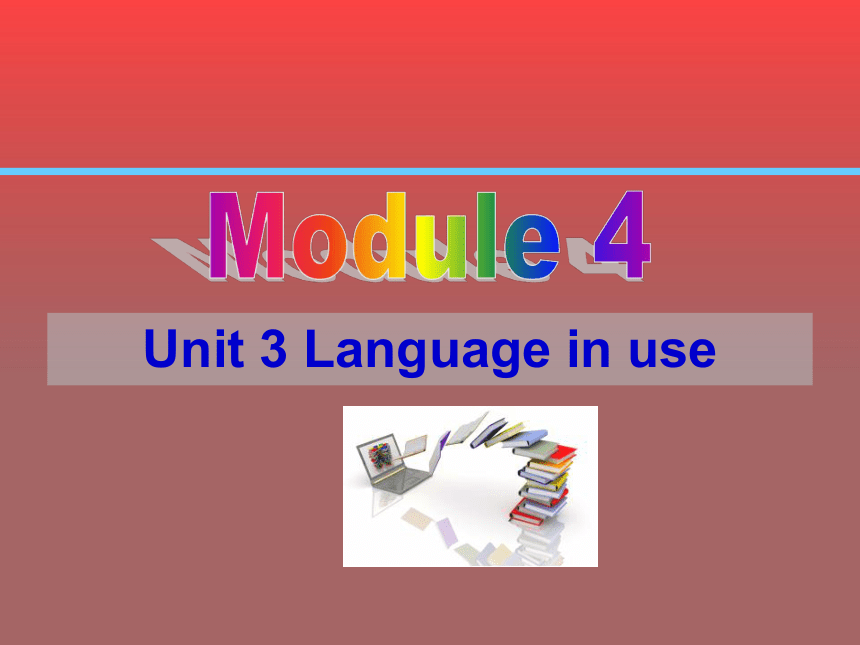 | |
| 格式 | zip | ||
| 文件大小 | 2.2MB | ||
| 资源类型 | 教案 | ||
| 版本资源 | 外研版 | ||
| 科目 | 英语 | ||
| 更新时间 | 2020-04-17 20:24:22 | ||
图片预览



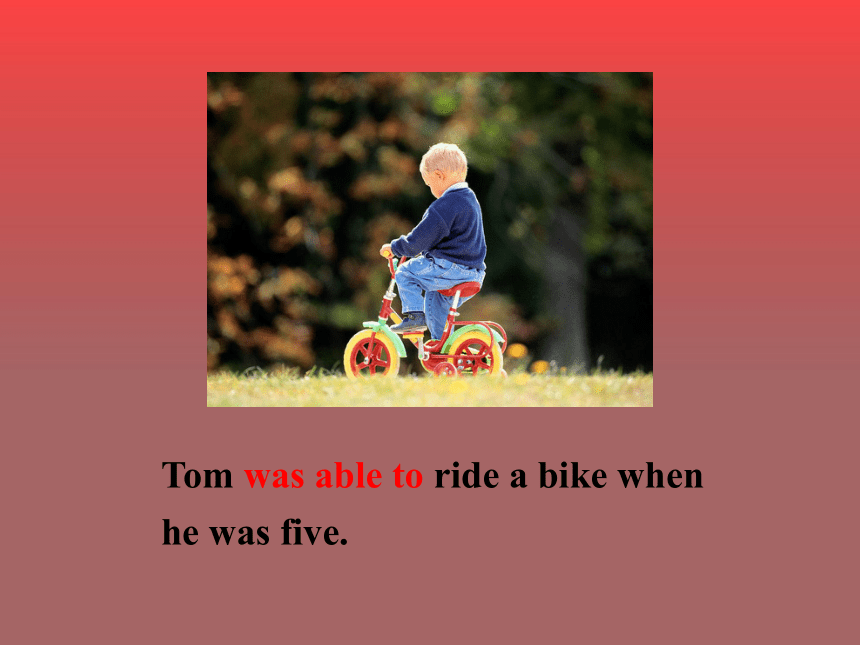

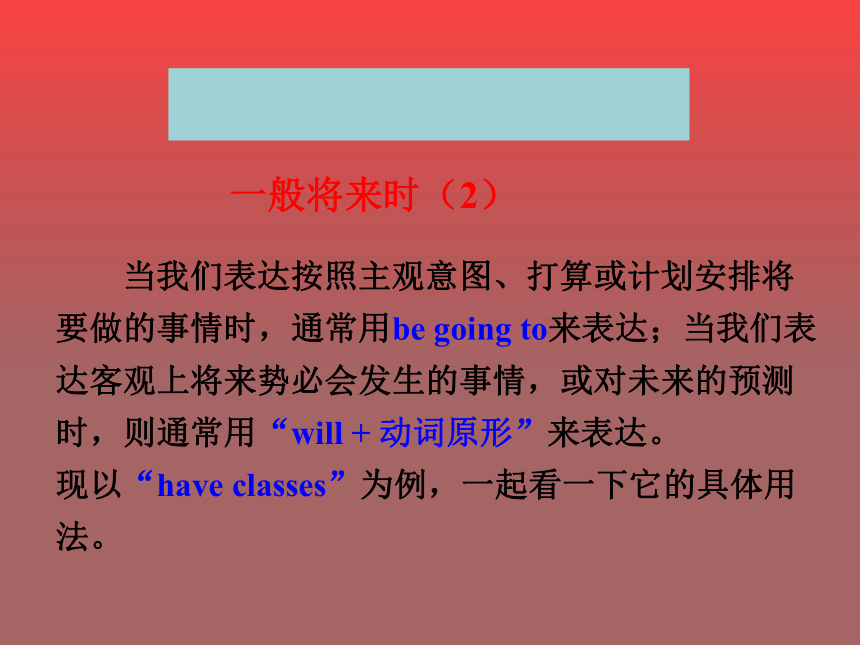
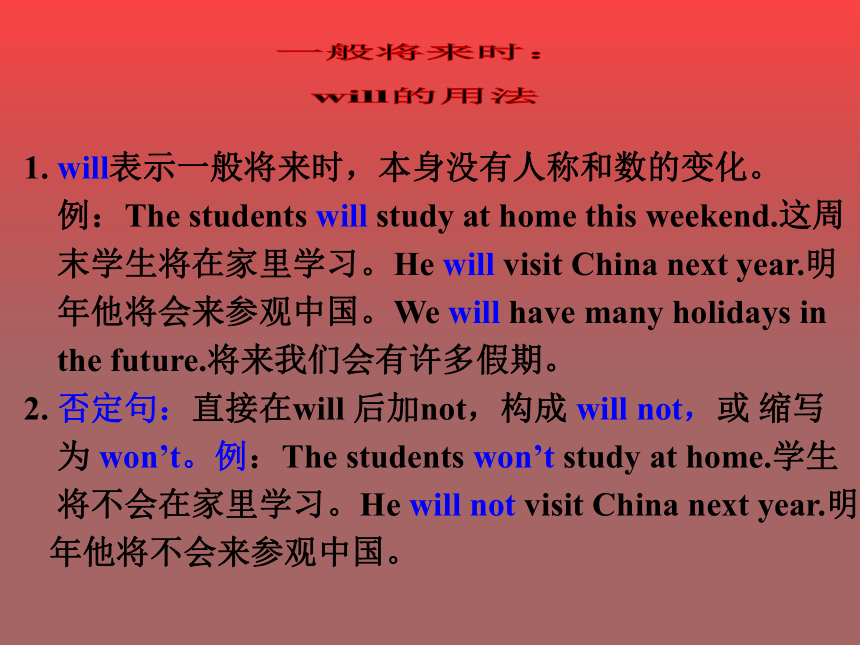
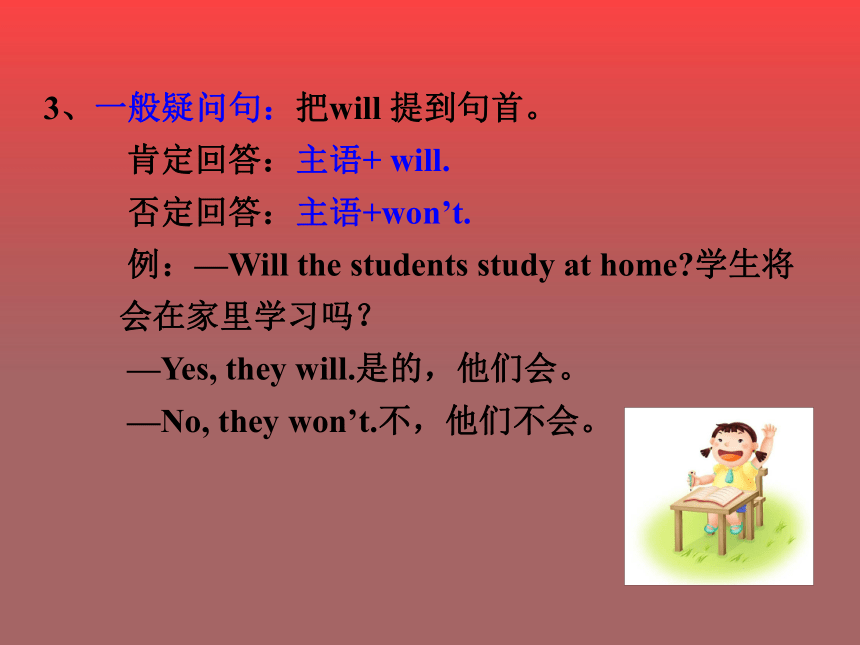


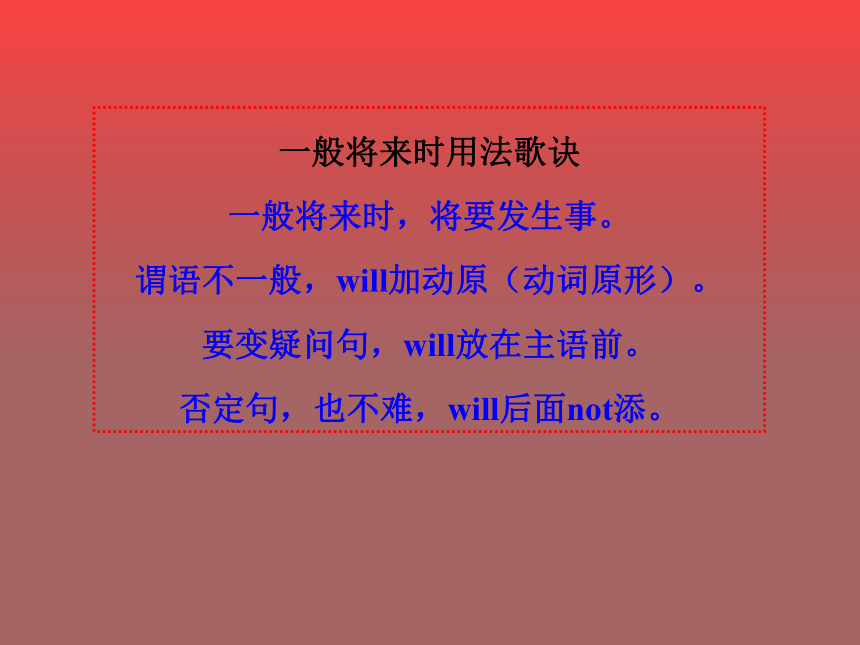
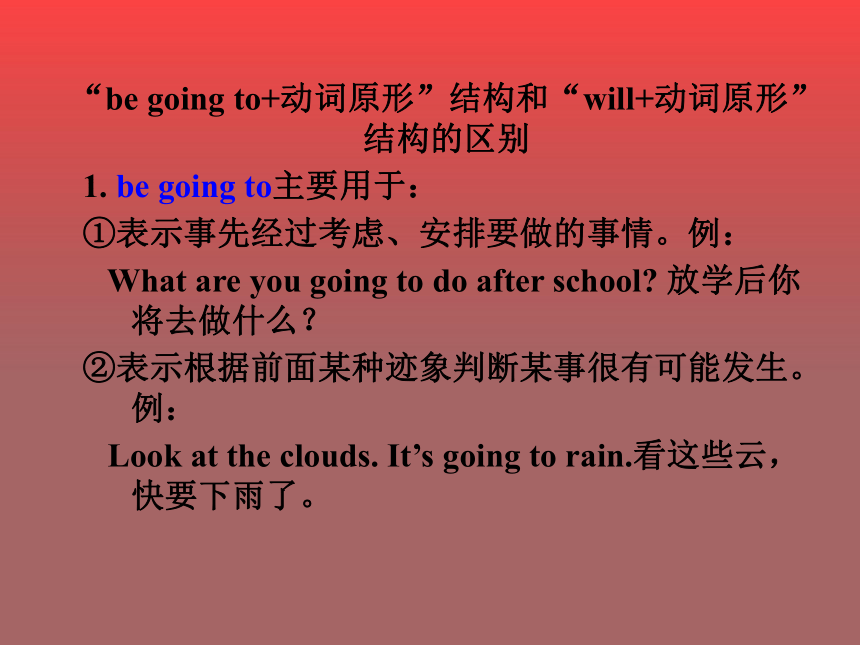
文档简介
(共47张PPT)
Unit 3 Language in use
— How soon will you be back?
— In a month.
They want to travel by air.
Tom was able to ride a bike when he was five.
They aren’t children any more.
一般将来时(2)
当我们表达按照主观意图、打算或计划安排将要做的事情时,通常用be going to来表达;当我们表达客观上将来势必会发生的事情,或对未来的预测时,则通常用“will + 动词原形”来表达。
现以“have classes”为例,一起看一下它的具体用法。
1. will表示一般将来时,本身没有人称和数的变化。
例:The students will study at home this weekend.这周
末学生将在家里学习。He will visit China next year.明
年他将会来参观中国。We will have many holidays in
the future.将来我们会有许多假期。
2. 否定句:直接在will 后加not,构成 will not,或 缩写
为 won’t。例:The students won’t study at home.学生
将不会在家里学习。He will not visit China next year.明
年他将不会来参观中国。
3、一般疑问句:把will 提到句首。
肯定回答:主语+ will.
否定回答:主语+won’t.
例:—Will the students study at home?学生将
会在家里学习吗?
—Yes, they will.是的,他们会。
—No, they won’t.不,他们不会。
????
句式结构 例句
肯定句 Sb. + will + 动词原形+ 其他 I will have classes tomorrow.
否定句 Sb. + will + not + 动词原形+ 其他 I will not / l won’t have any classes tomorrow.
一般疑问句 Will + sb. + 动词原形+ 其他 —Will you have classes tomorrow? —Yes, I will. / No, I won’t.
注意: will没有人称和数的变化。
另外,一般将来时通常与以下时间状语连用: tomorrow(明天),next year(明年),from now on (从现在起),in a month(一个月之后), in the future(将来)等。如:
I will finish this work in a week.
我将在一周后完成这项工作。
一般将来时用法歌诀
一般将来时,将要发生事。
谓语不一般,will加动原(动词原形)。
要变疑问句,will放在主语前。
否定句,也不难,will后面not添。
“be going to+动词原形”结构和“will+动词原形”结构的区别
1. be going to主要用于:
①表示事先经过考虑、安排要做的事情。例:
What are you going to do after school? 放学后你将去做什么?
②表示根据前面某种迹象判断某事很有可能发生。 例:
Look at the clouds. It’s going to rain.看这些云,快要下雨了。
2. will主要用于:
①在口语中所有人称都可用will。
例:I’ll telephone you after I get home.我到家后给你打电话。
He will have dinner with the nice girl one day.有一天我将会和这个漂亮的女孩一起用餐。
②will表示单纯的将来概念,表示“将要”,通常可用各种人称。
It’ll soon be Christmas. I will see you tomorrow.圣诞节马上到了,我明天可以见到你了。
③表示不以人的意志为转移的自然发展的未来事情, 用will。
例:Tom will be sixteen years old next year. 明年汤姆就16岁了。
④问对方是否愿意做某事和表示客气的邀请或命令 时,常用will。口语中常用would代替will。例: Will you please open the door?请你开下门好吗?
⑤表示带“意愿”色彩的将来时,用will。
例:Tom will help me with my English. 汤姆将会帮助我学习英语。
1. I __________ (will leave / leave) in a minute.
2. —Where is your sister, Jane?
—She ___________ (is doing / does) her homework in her room. She ___________ (will play / is playing) football with her friends after that.
3. I _____ (am / will be) free today, so I _____ (go / will go) to bed early tonight.
will leave
is doing
will play
am
will go
一、填空。
5. The woman __________ (gets up / is getting up) at
7:00 every day. But she plans to _____ (get up / gets
up) early tomorrow because she ________ (has / will
have) a meeting tomorrow morning.
4. Next Monday is Mary’s birthday. Her mother
__________ (gives / will give) her a present.
will give
gets up
get up
will have
2. — Will his parents go to the US tomorrow?
— No, _______.
A. they willn’t B. they won’t
C. they aren’t D. they don’t
B
二、单项选择。
1. There _______ a birthday party this
Sunday.
A. shall be B. will be
C. shall going to be D. will going to be
B
3. There ________ a fashion show this Sunday.
A. shall be B. will be
C. shall going to be D. will going to be
4. They ________ an English evening next Sunday.
A. have B. are going to have
C. will having D. is going to have
B
B
5. ________ you ________ free next Sunday?
A. Will; are B. Will; be
C. Do; be D. Are; be
6. He ________ there at ten tomorrow morning.
A. will B. is C. will be D. be
7. — Shall I come again tomorrow afternoon?
— ________.
A. Yes, please B. Yes, you will
C. No, please D. No, you won’t
B
C
B
8. ________ your brother ________ a magazine from
the library?
A. Are; going to borrow B. Is; going to borrow
C. Will; borrows D. Are; going to borrows
9. It ________ the year of the snake next year.
A. is going to be B. is going to
C. will be D. will is
10. ________ open the window?
A. Will you please B. Please will you
C. You please D. Do you
A
A
B
Read the sentences and pay attention to the underlined parts.
Every family will have a small plane.
Teachers won’t use chalk on a blackboard.
What will life be like in the future?
Will schools be different in the future?
Yes, they will.
1 Complete the questions about the future.
Will students go (go) to school in the future?
1. _______________ (use) pens and paper?
2. ________________ (read) books?
3. _______________ (travel) by small planes?
4. _______________ (send) emails to teachers?
Will students use
Will students read
Will people travel
Will students send
2 Work in pairs. Ask and answer the questions
in Activity 1.
— Will students go to school
in the future?
— Yes, they will./
— No, they won’t. They’ll study at home.
— Will students read books?
— Yes, they will./
— No, they won’t.
— Will students use pens and paper?
— Yes, they will./
— No, they won’t.
— Will students send emails to teachers?
— Yes, they will./
— No, they won’t.
— Will people travel by small planes?
— Yes, they will./
— No, they won’t.
先看例句:
They’ll have a lot of time! (free)
They’ll have a lot of free time!
Put the words in brackets in the correct place in the sentences.
People won’t have any jobs. (difficult)
People won’t have any difficult jobs.
2. Robots will do work on farms. (heavy)
Robots will do heavy work on farms.
3. People will have holidays. (long)
People will have long holidays.
4. There will be rain this evening. (light)
There will be light rain this evening.
4 Put the words and expressions from the
box into the correct column.
email heavy rain heavy work hot summer interesting job Internet small plane
traffic jam warm winter wind
heavy rain
hot summer
warm winter
wind
email
Internet
heavy work
interesting job
small plane
traffic jam
Weather Computer Job Travel
Japan has many robots now and you can see lots of them in the country. You can find worker robots, robots that clean your home, and even robots you can play with.
Robots in Japan
Making a poster about life in the future in your home town.
Module Task:
○Schools ○Homes
○Travel ○Weather
5 Think about life in the future. Write down
your ideas.
A: What will schools be like in the future?
B: The teacher won’t write on a blackboard ...
C: How will our homes change?
D: There will be more machines ...
6 Work in groups of four. Talk about your ideas.
Decide on five good ideas.
A: Will we find new ways to travel?
B: Yes, we will. We’ll ...
C: Will the weather change?
D: Yes, it will. It will be ...
Schools
Home
Travel
Weather
no books or pens, won't use chalk,
write homework on the computer,
send...to... by email ...
have robots, can cook, clean the room,
have new kind of clothes...
won't travel by bus,have a small plane,
long holidays…
will change, quite warm,even hot, heavy rain, strong wind ...
7 Make a poster. Include five of your good ideas.
Life in the future
Life in the future will be very different. we’ll…
Life in the future
Life in the future will be very different. We'll have robots to do everything. They will cook, clean the house and drive buses. Working hours will be short and people will have long holidays. And people will travel by plane because flying will be cheap and easy. At school, students won't use books or pens, everyone will have a computer.
They will write the homework on the computer and send it to the teachers by emails. In the future, the weather will change. It will be hotter and there will be more strong wind and heavy rain.
Life in the future will be very interesting.
Language points
1. Will students send emails to teachers?
send是及物动词,意为“寄;发送”,常用搭配:
①send sb.sth.=send sth.to sb.意为“送给某人某
物”。例:He often sends me some interesting
things.=He often sends some interesting things to
me.他经常送给我一些有趣的东西。
②send sb.to sp.意为“把某人送到某地”。 例:My father sent me to a good school last year.爸爸去年把我送到了一所好学校。
2. interesting job
【辨析】 interesting与interested
①interesting意为“有趣的”,它既可作定语,也
可作表语。它作定语时常用来修饰事物;作表语
时主语通常是物。
②interested意为“感兴趣的”,其主语通常是人。
常用短语:be interested in对……感兴趣。
【一言辨异】My sister is interested in this interesting film.我妹妹对这部有趣的电影很感兴趣。
3. Will we find new ways to travel?
way作名词,意为“方式,方法”。常用搭配:the
way to do sth.=the way of doing sth.做某事的方式。
例:I have a good way to solve the problem.=I have
a good way of solving the problem.我有一个好办法
来解决这个问题。
【拓展】way还可意为“道路,方向”。常用短语:on the/one's way to 在某人去……的路上。例:On my way to school,I saw a cute dog.在我去学校的路上,我看到一只可爱的狗。
1. it, be, in, will, in, cool, warm, winter, summer, and(连词成句) ______________________________________
2. Students will have more homework to.(改为否定句)
______________________________________
3. He comes back home.(用next Monday改写句子)
______________________________________
It will be warm in winter and cool in summer.
Students won’t have more homework to do.
He will come back home next Monday.
Exercises
一、按要求完成句子。
4. Everyone will have a car in the future. (改成
一般疑问句,并作肯定回答)
__________________________________
__________________________________
5. We will celebrate Spring Festival in Beijing
this year. (对画线部分提问)
______________________________
______________________________
Will everyone have a car in the future?
Yes, they will.
Where will you celebrate Spring Festival this year?
二、根据汉语意思完成句子。
1. 安下周要买一台电脑。
Ann ________ ________ a computer next week.
2. 老师将不再用粉笔在黑板上写字。
The teacher ______ ______ on the blackboard ______ ______ .
3. 将来每个家庭都会有一个机器人吗?
________ _______ _______ a robot in every family in the future?
will buy
won’t write
with chalk
Will there be
4. 一切将会免费。
Everything ________ ________ free.
5. 请教我学数学好吗?
________ you ________ me with my math?
6. 我想送我朋友一张卡片。
I want to ________ a postcard ________my
friend.
will be
Will
help
send
to
Summary
Summarised and practised the use
of simple future tense with will.
Try your best to master what you have learned in this module and preview the next module.
Homework
Unit 3 Language in use
— How soon will you be back?
— In a month.
They want to travel by air.
Tom was able to ride a bike when he was five.
They aren’t children any more.
一般将来时(2)
当我们表达按照主观意图、打算或计划安排将要做的事情时,通常用be going to来表达;当我们表达客观上将来势必会发生的事情,或对未来的预测时,则通常用“will + 动词原形”来表达。
现以“have classes”为例,一起看一下它的具体用法。
1. will表示一般将来时,本身没有人称和数的变化。
例:The students will study at home this weekend.这周
末学生将在家里学习。He will visit China next year.明
年他将会来参观中国。We will have many holidays in
the future.将来我们会有许多假期。
2. 否定句:直接在will 后加not,构成 will not,或 缩写
为 won’t。例:The students won’t study at home.学生
将不会在家里学习。He will not visit China next year.明
年他将不会来参观中国。
3、一般疑问句:把will 提到句首。
肯定回答:主语+ will.
否定回答:主语+won’t.
例:—Will the students study at home?学生将
会在家里学习吗?
—Yes, they will.是的,他们会。
—No, they won’t.不,他们不会。
????
句式结构 例句
肯定句 Sb. + will + 动词原形+ 其他 I will have classes tomorrow.
否定句 Sb. + will + not + 动词原形+ 其他 I will not / l won’t have any classes tomorrow.
一般疑问句 Will + sb. + 动词原形+ 其他 —Will you have classes tomorrow? —Yes, I will. / No, I won’t.
注意: will没有人称和数的变化。
另外,一般将来时通常与以下时间状语连用: tomorrow(明天),next year(明年),from now on (从现在起),in a month(一个月之后), in the future(将来)等。如:
I will finish this work in a week.
我将在一周后完成这项工作。
一般将来时用法歌诀
一般将来时,将要发生事。
谓语不一般,will加动原(动词原形)。
要变疑问句,will放在主语前。
否定句,也不难,will后面not添。
“be going to+动词原形”结构和“will+动词原形”结构的区别
1. be going to主要用于:
①表示事先经过考虑、安排要做的事情。例:
What are you going to do after school? 放学后你将去做什么?
②表示根据前面某种迹象判断某事很有可能发生。 例:
Look at the clouds. It’s going to rain.看这些云,快要下雨了。
2. will主要用于:
①在口语中所有人称都可用will。
例:I’ll telephone you after I get home.我到家后给你打电话。
He will have dinner with the nice girl one day.有一天我将会和这个漂亮的女孩一起用餐。
②will表示单纯的将来概念,表示“将要”,通常可用各种人称。
It’ll soon be Christmas. I will see you tomorrow.圣诞节马上到了,我明天可以见到你了。
③表示不以人的意志为转移的自然发展的未来事情, 用will。
例:Tom will be sixteen years old next year. 明年汤姆就16岁了。
④问对方是否愿意做某事和表示客气的邀请或命令 时,常用will。口语中常用would代替will。例: Will you please open the door?请你开下门好吗?
⑤表示带“意愿”色彩的将来时,用will。
例:Tom will help me with my English. 汤姆将会帮助我学习英语。
1. I __________ (will leave / leave) in a minute.
2. —Where is your sister, Jane?
—She ___________ (is doing / does) her homework in her room. She ___________ (will play / is playing) football with her friends after that.
3. I _____ (am / will be) free today, so I _____ (go / will go) to bed early tonight.
will leave
is doing
will play
am
will go
一、填空。
5. The woman __________ (gets up / is getting up) at
7:00 every day. But she plans to _____ (get up / gets
up) early tomorrow because she ________ (has / will
have) a meeting tomorrow morning.
4. Next Monday is Mary’s birthday. Her mother
__________ (gives / will give) her a present.
will give
gets up
get up
will have
2. — Will his parents go to the US tomorrow?
— No, _______.
A. they willn’t B. they won’t
C. they aren’t D. they don’t
B
二、单项选择。
1. There _______ a birthday party this
Sunday.
A. shall be B. will be
C. shall going to be D. will going to be
B
3. There ________ a fashion show this Sunday.
A. shall be B. will be
C. shall going to be D. will going to be
4. They ________ an English evening next Sunday.
A. have B. are going to have
C. will having D. is going to have
B
B
5. ________ you ________ free next Sunday?
A. Will; are B. Will; be
C. Do; be D. Are; be
6. He ________ there at ten tomorrow morning.
A. will B. is C. will be D. be
7. — Shall I come again tomorrow afternoon?
— ________.
A. Yes, please B. Yes, you will
C. No, please D. No, you won’t
B
C
B
8. ________ your brother ________ a magazine from
the library?
A. Are; going to borrow B. Is; going to borrow
C. Will; borrows D. Are; going to borrows
9. It ________ the year of the snake next year.
A. is going to be B. is going to
C. will be D. will is
10. ________ open the window?
A. Will you please B. Please will you
C. You please D. Do you
A
A
B
Read the sentences and pay attention to the underlined parts.
Every family will have a small plane.
Teachers won’t use chalk on a blackboard.
What will life be like in the future?
Will schools be different in the future?
Yes, they will.
1 Complete the questions about the future.
Will students go (go) to school in the future?
1. _______________ (use) pens and paper?
2. ________________ (read) books?
3. _______________ (travel) by small planes?
4. _______________ (send) emails to teachers?
Will students use
Will students read
Will people travel
Will students send
2 Work in pairs. Ask and answer the questions
in Activity 1.
— Will students go to school
in the future?
— Yes, they will./
— No, they won’t. They’ll study at home.
— Will students read books?
— Yes, they will./
— No, they won’t.
— Will students use pens and paper?
— Yes, they will./
— No, they won’t.
— Will students send emails to teachers?
— Yes, they will./
— No, they won’t.
— Will people travel by small planes?
— Yes, they will./
— No, they won’t.
先看例句:
They’ll have a lot of time! (free)
They’ll have a lot of free time!
Put the words in brackets in the correct place in the sentences.
People won’t have any jobs. (difficult)
People won’t have any difficult jobs.
2. Robots will do work on farms. (heavy)
Robots will do heavy work on farms.
3. People will have holidays. (long)
People will have long holidays.
4. There will be rain this evening. (light)
There will be light rain this evening.
4 Put the words and expressions from the
box into the correct column.
email heavy rain heavy work hot summer interesting job Internet small plane
traffic jam warm winter wind
heavy rain
hot summer
warm winter
wind
Internet
heavy work
interesting job
small plane
traffic jam
Weather Computer Job Travel
Japan has many robots now and you can see lots of them in the country. You can find worker robots, robots that clean your home, and even robots you can play with.
Robots in Japan
Making a poster about life in the future in your home town.
Module Task:
○Schools ○Homes
○Travel ○Weather
5 Think about life in the future. Write down
your ideas.
A: What will schools be like in the future?
B: The teacher won’t write on a blackboard ...
C: How will our homes change?
D: There will be more machines ...
6 Work in groups of four. Talk about your ideas.
Decide on five good ideas.
A: Will we find new ways to travel?
B: Yes, we will. We’ll ...
C: Will the weather change?
D: Yes, it will. It will be ...
Schools
Home
Travel
Weather
no books or pens, won't use chalk,
write homework on the computer,
send...to... by email ...
have robots, can cook, clean the room,
have new kind of clothes...
won't travel by bus,have a small plane,
long holidays…
will change, quite warm,even hot, heavy rain, strong wind ...
7 Make a poster. Include five of your good ideas.
Life in the future
Life in the future will be very different. we’ll…
Life in the future
Life in the future will be very different. We'll have robots to do everything. They will cook, clean the house and drive buses. Working hours will be short and people will have long holidays. And people will travel by plane because flying will be cheap and easy. At school, students won't use books or pens, everyone will have a computer.
They will write the homework on the computer and send it to the teachers by emails. In the future, the weather will change. It will be hotter and there will be more strong wind and heavy rain.
Life in the future will be very interesting.
Language points
1. Will students send emails to teachers?
send是及物动词,意为“寄;发送”,常用搭配:
①send sb.sth.=send sth.to sb.意为“送给某人某
物”。例:He often sends me some interesting
things.=He often sends some interesting things to
me.他经常送给我一些有趣的东西。
②send sb.to sp.意为“把某人送到某地”。 例:My father sent me to a good school last year.爸爸去年把我送到了一所好学校。
2. interesting job
【辨析】 interesting与interested
①interesting意为“有趣的”,它既可作定语,也
可作表语。它作定语时常用来修饰事物;作表语
时主语通常是物。
②interested意为“感兴趣的”,其主语通常是人。
常用短语:be interested in对……感兴趣。
【一言辨异】My sister is interested in this interesting film.我妹妹对这部有趣的电影很感兴趣。
3. Will we find new ways to travel?
way作名词,意为“方式,方法”。常用搭配:the
way to do sth.=the way of doing sth.做某事的方式。
例:I have a good way to solve the problem.=I have
a good way of solving the problem.我有一个好办法
来解决这个问题。
【拓展】way还可意为“道路,方向”。常用短语:on the/one's way to 在某人去……的路上。例:On my way to school,I saw a cute dog.在我去学校的路上,我看到一只可爱的狗。
1. it, be, in, will, in, cool, warm, winter, summer, and(连词成句) ______________________________________
2. Students will have more homework to.(改为否定句)
______________________________________
3. He comes back home.(用next Monday改写句子)
______________________________________
It will be warm in winter and cool in summer.
Students won’t have more homework to do.
He will come back home next Monday.
Exercises
一、按要求完成句子。
4. Everyone will have a car in the future. (改成
一般疑问句,并作肯定回答)
__________________________________
__________________________________
5. We will celebrate Spring Festival in Beijing
this year. (对画线部分提问)
______________________________
______________________________
Will everyone have a car in the future?
Yes, they will.
Where will you celebrate Spring Festival this year?
二、根据汉语意思完成句子。
1. 安下周要买一台电脑。
Ann ________ ________ a computer next week.
2. 老师将不再用粉笔在黑板上写字。
The teacher ______ ______ on the blackboard ______ ______ .
3. 将来每个家庭都会有一个机器人吗?
________ _______ _______ a robot in every family in the future?
will buy
won’t write
with chalk
Will there be
4. 一切将会免费。
Everything ________ ________ free.
5. 请教我学数学好吗?
________ you ________ me with my math?
6. 我想送我朋友一张卡片。
I want to ________ a postcard ________my
friend.
will be
Will
help
send
to
Summary
Summarised and practised the use
of simple future tense with will.
Try your best to master what you have learned in this module and preview the next module.
Homework
同课章节目录
- Module 1 Lost and found
- Unit 1 Whose bag is this?
- Unit 2 Are they yours?
- Unit 3 Language in use
- Module 2 What can you do ?
- Unit 1 I can play the piano
- Unit 2 I can run really fast
- Unit 3 Language in use
- Module 3 Making plans
- Unit 1 What are you going to do at the weekends?
- Unit 2 We're going to cheer the players.
- Unit 3 Language in use
- Module 4 Life in the future
- Unit 1 Everyone will study at home
- Unit 2 Every family will have a small plane.
- Unit 3 Language in use
- Module 5 Shopping
- Unit 1 What can I do for you?
- Unit 2 You can buy everything on the Internet
- Unit 3 Language in use
- Module 6 Around town
- Unit 1 Could you tell me how to get to the Nationa
- Unit 2 The London Eye is on your right.
- Unit 3 Language in use
- Revision module A
- Module 7 My past life
- Unit 1 I was born in a small village.
- Unit 2 I was born in Quincy.
- Unit 3 Language in use
- Module 8 Story time
- Unit 1 Once upon a time….
- Unit 2 Goldilocks hurried out of the house.
- Unit 3 Language in use
- Module 9 Life history
- Unit 1 He left school and began work at the age of
- Unit 2 He decided to be an actor.
- Unit 3 Language in use
- Module 10 A holiday journey
- Unit 1 What did you do?
- Unit 2 This morning we took a walk.
- Unit 3 Language in use
- Module 11 Body language
- Unit 1 They touch noses!
- Unit 2 Here are some ways to welcome them.
- Unit 3 Language in use
- Module 12 Western music
- Unit 1 It's so beautiful!
- Unit 2 Vienna is the centre of European classical
- Unit 3 Language in use
- Revision module B
